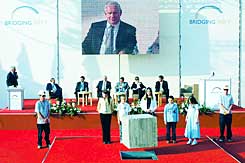The Americans emphasize: "a project that has nothing to do with politics", but the Jordanians are careful: the establishment of the center is not a step of normalization between the countries
Yoav Stern, Haaretz, wow

The cornerstone laying ceremony for the new center, yesterday. "They asked me to cut the border fence and that's what I did. I will also return it to its place, right after the ceremony," said a Hatzeva resident
Photo: Alberto Dankberg
Yesterday the cornerstone was laid for the new scientific center that will be built in Arava, on the border of Jordan: "Bridging the rift - to bridge the gap". The center will be built near Moshav Ein Yahav, near border stone 99. Half of it will be in Israeli territory and half in Jordanian territory, a kind of extraterritorial island on the border. The academic umbrella will be awarded by the American Cornell and Stanford universities. "We are building a scientific center here that will deal with the life sciences, and this is where the construction of a series of advanced databases will begin," explained Cornell's president, Jeff Lyman. "What is beautiful here is that we are setting up a project that has nothing to do with politics."
But his words are not accurate. It is clear to everyone that establishing a scientific center that will host Israeli, Jordanian and other students in the current period is no small matter. This could be learned from the words of the senior Jordanian representative at the ceremony, Minister of Planning Dr. Bassem Awadallah.
Awdallah holds a senior economic position in Jordan, equal in importance to that of the Minister of Finance. Before that he served as King Abdullah's economic advisor. When interviewed in Arabic, Awdallah emphasized that the establishment of the center is not a step towards normalization between Israel and Jordan, a word that upsets the Jordanian opposition: "Non-governmental organizations and American universities came here and asked to establish a scientific research center. We support the study of the environment and the desert, and Jordan, like the other countries in the region, will benefit greatly from research on the subject," he said.
In his speeches in English, on the other hand, he referred to the fact that the establishment of the center is part of the peace relations between the countries: "Imagine what could be done if the situation in the region was better," he told Israeli journalists. In his official speech, Awdallah made sure to explain that despite the joint project, Jordan has criticism of Israel's behavior: "We believe that peace should be expressed in projects of reconciliation and not in the construction of walls or fences," he said. "The Palestinian child should have hope, as well as the Israeli and Jordanian children."
The Israeli speakers emphasized the fact that this is a project that will strengthen peace in the region. "The way to build good relations between the countries is to start from the bottom, by laying stone after stone," said Finance Minister Benjamin Netanyahu, "and that is exactly what we are doing here today."
Netanyahu explained that it is much easier for the government to support a project led by a private entrepreneur, as in the current case: the Israeli businessman from New York, Mati Kochavi, is behind the project. The services of one of the largest architectural firms in the world, SOM, were hired for the establishment of the site. The responsible architect is Mustafa Abdan, of Turkish origin. "We will create an island of coexistence here," Abdan promised. "What symbolizes this is the circular area of the scientific center." In the heart of the desert center, Abdan is planning the "Tower of Knowledge", which will rise to a great height.
In the meantime, there are only three olive trees that Itzik Maoz, a resident of nearby Hatzava, managed to spray before the ceremony with a glossy spray. "I brought the trees for the ceremony, and I will take them from here at the end," said Maoz. He hopes that in a place where today there is nothing except a low border fence, a successful research center will be established that will give impetus to the region. "Who knows what will be here in five years. In the meantime, they asked me to cut the border fence and that's what I did. I will also return it to its place, right after the ceremony," he said.
https://www.hayadan.org.il/BuildaGate4/general2/data_card.php?Cat=~~~789473173~~~96&SiteName=hayadan
